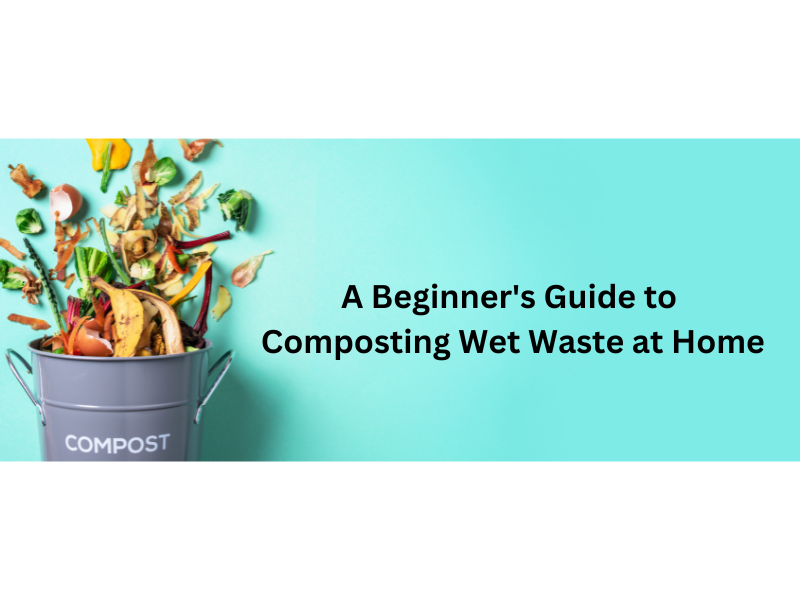Composting is an eco-friendly and sustainable way to manage organic waste while producing nutrient-rich soil for your garden. One of the key components of composting is managing wet waste, such as kitchen scraps and food leftovers. Composting wet waste at home not only reduces landfill waste but also helps create a valuable resource for your plants. In this beginner's guide, we will walk you through the process of composting wet waste step by step, allowing you to embark on a rewarding composting journey.
1. Understand the Basics of Composting:
Composting is the natural decomposition of organic matter, facilitated by microorganisms. These microorganisms break down the waste into nutrient-rich compost, which can then be used to improve soil fertility. Composting requires the right balance of organic materials, air circulation, moisture, and temperature.
2. Selecting a Composting Method:
There are various composting methods available, each catering to different space limitations, time commitments, and personal preferences. Here are a few popular options for composting wet waste at home:
a. Backyard Composting: Traditional compost pile or compost bin. This method requires a larger space but provides the benefit of larger compost quantities.
b. Vermicomposting: Vermicomposting involves using composting worms, such as earthworms, to decompose organic waste. This method is ideal for those with limited space or living in apartments. Worms speed up the decomposition process and produce high-quality compost.
c. Bokashi Composting: Bokashi composting is an anaerobic fermentation process that utilizes a special composting mix called "bokashi bran." It is suitable for small spaces and allows you to compost almost all types of organic waste, including meat and dairy.
3. Gather the Right Materials:
To compost wet waste effectively, you need a combination of "green" and "brown" materials. Green materials are rich in nitrogen and include kitchen scraps like fruit peels, vegetable trimmings, and coffee grounds. Brown materials are high in carbon and include dry leaves, shredded newspaper, and cardboard. Collect a good mix of both to ensure a balanced compost pile.
4. Establish the Composting Pile or Bin:
Whether you opt for a traditional compost pile or a compost bin, ensure proper aeration and drainage. Layer the green and brown materials alternately, aiming for a ratio of roughly three parts brown to one part green. This balance helps prevent odors, promotes decomposition, and maintains an ideal moisture level.
5. Maintain the Compost Pile:
Regular maintenance is crucial for successful composting. Keep the following points in mind:
a. Turning the Pile: Regularly turning the compost pile or mixing the materials in the bin helps promote air circulation, allowing the microorganisms to thrive and accelerate the decomposition process. Aim to turn the pile every two to three weeks.
b. Moisture Control: Compost should be moist but not soggy. Keep an eye on the moisture levels and add water or dry materials as needed to maintain a damp consistency.
c. Temperature Monitoring: The composting process generates heat. If the pile gets too hot, turn it to prevent overheating.
6. Troubleshooting Common Issues:
Composting can sometimes encounter challenges, but with proper troubleshooting, you can overcome them. Here are a few common issues and their solutions:
a. Foul Odors: Foul smells indicate anaerobic conditions. Add more brown materials, turn the pile, and ensure proper aeration.
b. Pests and Flies: Avoid attracting pests by burying food scraps deep within the compost pile and covering them with brown materials. If necessary, use a mesh or lid to deter flies.
c. Slow Decomposition: If your composting process is taking longer than expected, ensure that you have the right balance of green and brown materials. Adjust the ratio if necessary, and consider adding compost activators like garden soil or finished compost to speed up the process.
Composting wet waste at home is a rewarding and environmentally friendly practice. By following this beginner's guide, you can start your own composting journey and reduce the amount of organic waste that goes to landfills. Remember to be patient and consistent in maintaining your compost pile or bin, and soon enough, you'll have nutrient-rich compost to nourish your plants and improve the overall health of your garden. Get started today and contribute to a greener future!

